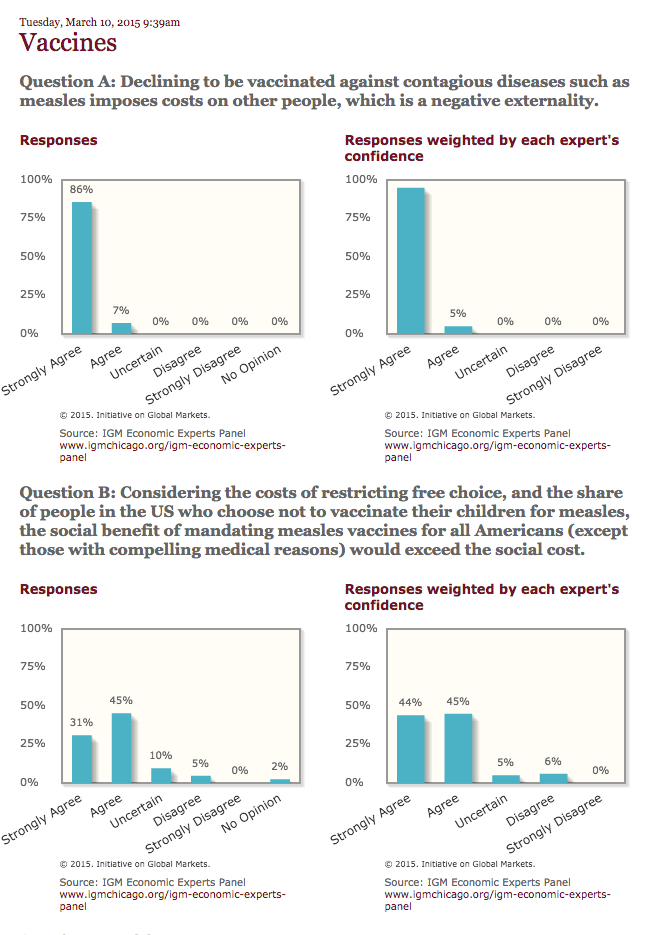
Why Criminal Defendants Should Choose Their Judges
A study of South Carolina data finds that ‘judge shopping’ could lead to more consistent sentencing.
Why Criminal Defendants Should Choose Their JudgesAs the recent measles outbreak in 17 states and the District of Columbia has begun to fade from headlines, at least 29 states have introduced legislation that would make it harder for parents to obtain vaccination exemptions for their children. This week, the IGM Economic Experts Panel considers the costs and benefits of a government mandate.
Declining to be vaccinated against contagious diseases such as measles imposes costs on other people, which is a negative externality.
This very straightforward economics-based statement received an entirely positive response from participants, who all agreed that, for example, getting polio because others are not vaccinated is a problem. “Costs grow as the number declining to be vaccinated rises, which the doubters do not seem to appreciate,” said Chicago Booth’s Anil Kashyap.
Some of the academics pointed out the fallibility of the preventatives as another reason for everyone to receive the shots. “Even those vaccinated can get the diseases so there is an external cost both to the vaccinated and the non-vaccinated,” said Berkeley’s Aaron Edlin.
Richard Thaler of Chicago Booth found the statement rather obvious. “This is one of the periodic questions designed to see whether respondents are awake. True by definition.”
“This is first principles in economics,” said Stanford’s Caroline Hoxby.
Considering the costs of restricting free choice, and the share of people in the US who choose not to vaccinate their children for measles, the social benefit of mandating measles vaccines for all Americans (except those with compelling medical reasons) would exceed the social cost.
The panelists had a more difficult time with the second statement, which considered whether the social benefits would outweigh the social costs of a mandate. More than three-quarters of the respondents agreed that benefits outweigh costs, but worries about mandates arose for several of the respondents. “Measles had been eliminated, it is a shame that it is back. But we should be careful about mandates in general,” said Kashyap with his response of agreement.
“The question requires one to impose a social welfare function, which is something an economists should NEVER do. No one made us God,” said Hoxby with her response of no opinion.
Daron Acemoglu and David Autor, both of MIT, disagreed with the second statement, but left no comment to enlighten us about their thinking. But these questions make it clear that like many Americans, the IGM Forum members support vaccination, yet are cautious about government intervention in requiring them. Unfortunately, this is an issue that will rise again, even as the current outbreak in the US subsides. In 2013 alone, 145, 700 people died of measles around the world, meaning the debate is far from over.


A study of South Carolina data finds that ‘judge shopping’ could lead to more consistent sentencing.
Why Criminal Defendants Should Choose Their Judges
UCLA’s Sebastian Edwards joins Bethany McLean and Luigi Zingales to discuss the implementation of market-oriented policies in Chile.
Capitalisn’t: Key Lessons from the ‘Chicago Boys’ Chile Experiment
Three experts in the theory and practice of hybrid work discuss its potential impact on the labor market.
How is WFH Shaping the Job Market?Your Privacy
We want to demonstrate our commitment to your privacy. Please review Chicago Booth's privacy notice, which provides information explaining how and why we collect particular information when you visit our website.